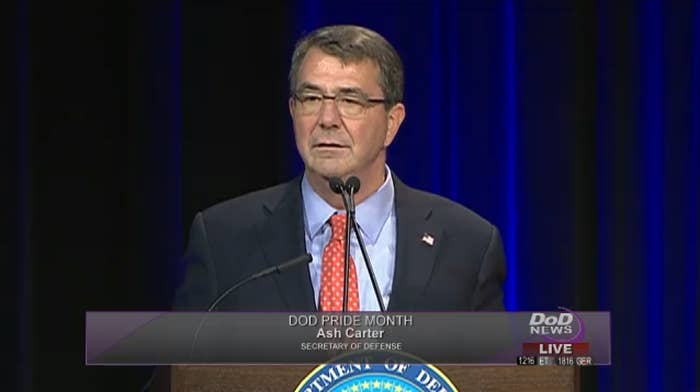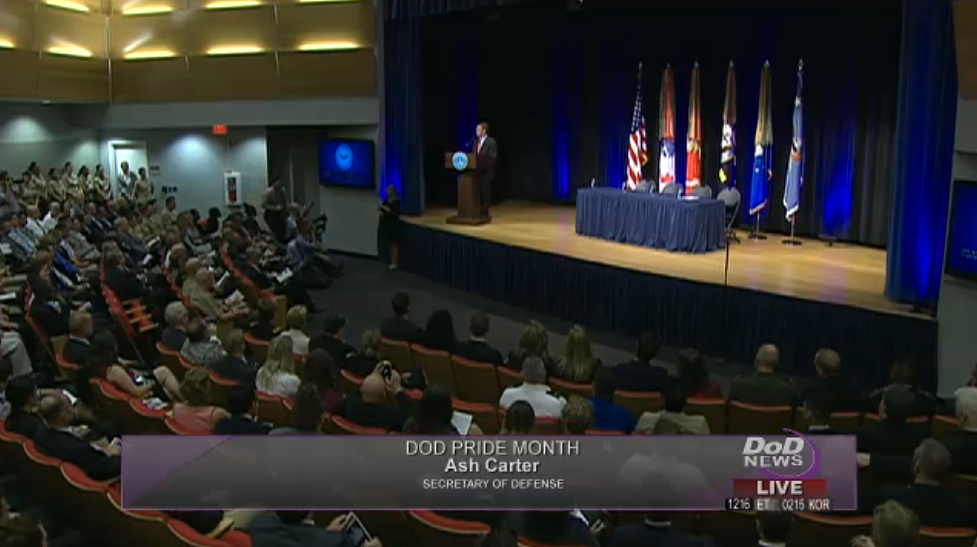
WASHINGTON — Defense Secretary Ashton Carter announced on Tuesday that the Pentagon was adding sexual orientation to the Defense Department's equal opportunity policy — a step long sought by advocates for gay, lesbian, and bisexual service members.
While detailing the "critical" need for the military to "start from a position of inclusivity, not exclusivity," however, the defense secretary made no direct mention of the other big issue pending for attendees of the LGBT pride month event at the Pentagon: out transgender military service.
"We need to be a meritocracy," Carter said at the event. "We need to focus relentlessly on our mission, which means the thing that matters most about a person is what they can contribute to national defense. This is a commitment we must continually renew."
To that end, he said, the Defense Department has "completed the process for updating its military equal opportunity policy to include sexual orientation, ensuring that the department, like the rest of the federal government, treats sexual orientation-based discrimination the same way it treats discrimination based on race, religion, color, sex, age, and national origin."
In addition to announcing the equal opportunity policy change, Carter also was aggressive in his discussion of the actions taken by the Pentagon to provide benefits for and recognition to same-sex spouses of service members.
"Here at the Pentagon, we have been and remain strongly committed to making sure that all military families and spouses can fully and equally receive the benefits their loved ones have earned, from TRICARE coverage to housing allowance to side-by-side burial at Arlington," he said. "Even in times of resistance, like when some states wouldn't issue DOD ID cards to same-sex spouses at National Guard facilities, we pushed back — not just because our service members and families deserved it but because everyone's rights had to be protected."
After detailing those steps, Carter began an extended and emphatic defense of the importance of stopping discrimination within the military and the importance to the military of ensuring diversity in its ranks, saying, "Discrimination, of any kind, has no place in [the] Armed Forces."
He continued:
"Recognizing that our openness to diversity is one of the things that have allowed us to be the best in the world, we must ensure that everyone who is able and willing to serve has the full and equal opportunity to do so. We must start from a position of inclusivity, not exclusivity. Anything less is not just plain wrong, it's bad defense policy.
"Embracing diversity and inclusion is critical to recruiting and retaining the force of the future. Young Americans today are more diverse, open, and tolerant than past generations. If we're going to attract the best and brightest among them to contribute to our mission of national defense, we have to ourselves be more diverse, open, and tolerant, too. It's the only way to compete in the 21st century."
He did not, however, say anything specific about the future for transgender people who are currently serving — such as Major Jamie Lee Henry, who spoke with BuzzFeed News prior to and was planning to attend Tuesday's event — or who wish to serve.
Asked about the equal opportunity development, Pentagon spokesman Lt. Cdr. Nate Christensen told BuzzFeed News the following:
"After an internal assessment, we have decided that discrimination cases based on sexual orientation will now be considered along with race, color, religion, sex, or national origin, as part Military Equal Opportunity (MEO) program.
"With this policy revision, we are now ensuring that servicemembers are afforded protection against discrimination in the Department's military equal opportunity program, provided to all military members. Along with command channels and the IG, servicemembers will now be able to use the Military EO process, just like DoD civilians are able to use civilian EEO programs to resolve discrimination complaints based on sexual orientation.
"The Department's experience during the years since DADT was repealed indicates that the MEO program gives complainants greater access to a broader range of resolution options, and gives Commanders access to trained Equal Opportunity Advisors during the complaints process."

